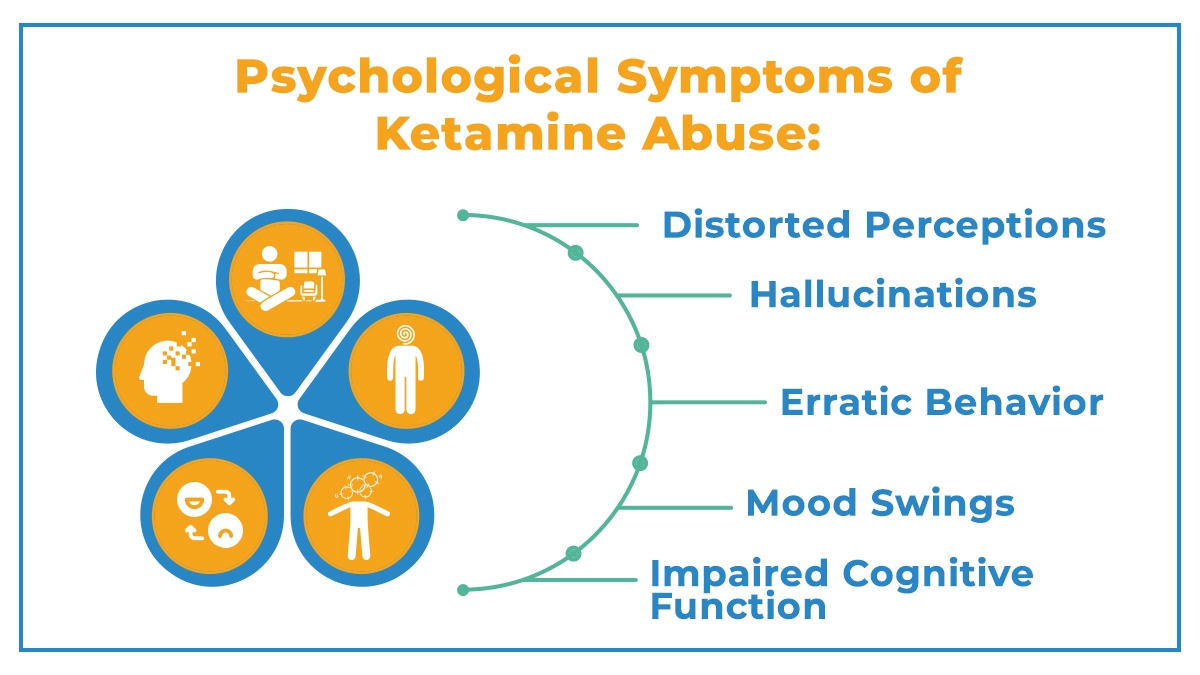
Effectiveness Of Medication-Assisted Treatment
Explore the effectiveness of medication-assisted treatment with The Recovery Team-Newton.

Ketamine, primarily used as an anesthetic and analgesic in medical settings, has gained popularity as a recreational substance, leading to concerns about its misuse. It is essential to recognize the symptoms of ketamine abuse, as it can affect individuals from diverse backgrounds.
Recognizing these signs is vital to prompt intervention and support. By shedding light on the potential indicators, we aim to empower everyone to identify and address this issue effectively, promoting a healthier, safer community.
Ketamine has gained popularity as a recreational substance, leading to concerns about its misuse. Here’s what you need to know:
The Recovery Team-Newton is a facility that offers personalized care for individuals seeking recovery from substance abuse. Contact us at (508) 978-2772 to explore our treatment options for lasting recovery.
Ketamine, initially developed as an anesthetic for medical purposes, has seen a surge in misuse in recent years. It belongs to the class of dissociative anesthetics, altering perception and inducing a sense of detachment from reality. While it can be beneficial under controlled medical conditions, its misuse poses serious health risks.
Ketamine’s primary function is to induce anesthesia, making it useful for surgeries and medical procedures. However, its recreational use has increased, leading to concerns about its mark on mental and physical health.
The drug’s availability on the illicit market has contributed to its rising misuse. Ketamine misuse transcends socio-economic boundaries, affecting individuals from various backgrounds.
Learning the reasons behind this surge is necessary to overcome the issue. Factors such as ease of access, misconceptions about its safety, and its dissociative effects attracting recreational users have all contributed to the rise of ketamine misuse. Acknowledging these factors is vital to addressing the issue effectively.
Distinguishing between the use and abuse of ketamine is vital for understanding its potential harm. While ketamine has legitimate medical applications, its misuse involves consuming it without a valid prescription or for recreational purposes. Identifying the blurred line between responsible use and abuse is essential for early intervention and addressing the risks associated with ketamine misuse.
Ketamine abuse manifests through various psychological symptoms:
In addressing ketamine misuse, early recognition of signs, seeking support, and promoting education are pivotal steps toward safeguarding mental and physical well-being.
Short-term ketamine abuse can lead to a range of immediate health effects, impacting both the body and the mind.
Physically, ketamine abuse can cause nausea, increased heart rate, and elevated blood pressure. People may also experience impaired motor function and coordination. Psychologically, the drug induces a sense of dissociation and detachment, leading to poor judgment and decision-making.
Ketamine abuse has pronounced effects on mental health. People may encounter anxiety, paranoia, and a distorted sense of reality. Prolonged use can contribute to the development of psychiatric disorders, exacerbating existing mental health issues.
Continued ketamine abuse poses severe long-term consequences, affecting both physical and mental well-being.
Persistent ketamine abuse can lead to damage to the urinary and gastrointestinal systems. Chronic use may result in bladder dysfunction, inflammation, and even ulceration. These physical consequences highlight the importance of addressing ketamine misuse before it evolves into a chronic problem.
Long-term ketamine abuse significantly increases the risk of developing mental health disorders. Depression, anxiety, and cognitive impairments are expected outcomes. The dissociative nature of ketamine can exacerbate existing mental health issues, emphasizing the need for early intervention and support.
Identifying signs of dependence is crucial in addressing ketamine misuse and preventing further health deterioration.
Physical dependence on ketamine is marked by withdrawal symptoms when use is reduced or discontinued.
Withdrawal symptoms: Physical dependence on ketamine may lead to tremors, sweating, and intense cravings when use is reduced.
Increased tolerance: Individuals may require higher doses over time to achieve the desired effects.
Persistent use despite negative consequences: Continued reliance on ketamine, even when it negatively impacts health and well-being, is a sign of physical dependence.
Early identification of these signs can aid in the prevention of escalating dependence.
Psychological dependence is characterized by an overwhelming desire to use ketamine despite its negative consequences.
Overwhelming desire: Psychological dependence on ketamine involves a potent, persistent urge to use ketamine.
Prioritizing drug use: Individuals may place obtaining and using ketamine above other essential aspects of their lives.
Neglecting responsibilities: Psychological dependence can lead to neglect of work, relationships, and daily tasks.
Continued use despite consequences: Even when facing adverse outcomes, those psychologically dependent on ketamine may find it challenging to stop use.
Everyone must understand the signs of dependence, whether physical or psychological, crucial in addressing ketamine misuse. Early recognition, support, and education are vital in promoting healthier choices and fostering well-being.
Ketamine overdose is a critical medical emergency that requires immediate attention. Understanding the symptoms and taking swift action is essential in preventing fatal outcomes.
It is essential to learn ketamine overdose symptoms for everyone to prevent potentially life-threatening situations.
Being aware of ketamine overdose symptoms empowers individuals to take swift action in emergencies, potentially saving lives.
If someone shows signs of a ketamine overdose, call 911 immediately. Stay with them, ensure they’re breathing, and provide basic life support if needed.
Offer information on the person’s drug history to emergency responders. Please do not leave them alone. Do not induce vomiting. Keep the person calm and monitor their vital signs. Cooperate with emergency responders for the person’s well-being.
Seeking help for ketamine abuse involves a multi-faceted approach toward recovery. Learn about different treatment options to navigate the journey to a healthier life.
Detoxification is the initial step in overcoming ketamine abuse. It involves safely managing withdrawal symptoms as the body eliminates the drug. Professional medical supervision during detox is crucial for a smoother process.
Various treatment settings are available to address ketamine abuse. Inpatient treatment provides intensive care in a facility, offering 24/7 support. Outpatient programs allow you to live at home while attending scheduled therapy sessions.
Experts may prescribe certain medications to assist in the recovery from ketamine abuse in medication-assisted treatment. These can help manage cravings and withdrawal symptoms. Consult a healthcare expert to specify the most suitable medication for your situation.
Behavioral therapies focus on altering patterns of thinking and behavior associated with ketamine abuse. Cognitive behavioral therapy (CBT) is employed to help individuals develop coping strategies and prevent relapse.
Seeking help is crucial, and recovery is possible. Choose a treatment that aligns with your conditions and consult healthcare professionals for guidance.
At The Recovery Team-Newton, we understand the essence of overcoming addiction challenges, offering tailored services that cater to the diverse needs of individuals.
We offer a structured day treatment program that combines therapy, skill-building, and peer support for an immersive care experience. Our outpatient program incorporates evidence-based practices, empowering individuals to thrive daily. For those with complex needs, our dual diagnosis program integrates mental health and substance use disorder treatment.
Transform your recovery experience with us. Contact us at (508) 978-2772 for a personalized approach.
Ketamine was initially developed for medical use and is now a popular recreational drug that comes in liquid and powder forms. Its abuse may cause physical symptoms such as increased heart rate, high blood pressure, and impaired coordination. People might experience blurred vision, dizziness, and nausea.
Regular ketamine use, especially in social settings, can result in addiction and treatment-resistant depression. Psychological addiction may also occur, leading to the need for ketamine addiction treatment in a specialized facility due to respiratory depression and other health risks associated with its abuse.
Ketamine, initially a medical anesthetic, gained popularity as a club drug, leading to widespread ketamine abuse. In high doses, it induces dissociative and hallucinogenic effects, often resulting in a trance-like state known as the k-hole.
Ketamine addiction poses serious risks, including urinary tract issues, near-death experiences, and memory loss. Chronic pain patients may receive pharmaceutical ketamine, but misuse can lead to ketamine bladder syndrome. Signs of ketamine addiction include substance abuse, out-of-body experiences, and family problems.
Awareness is vital, as ketamine, also known as Special K, can be misused, causing mental health problems and even sexual assault. Treatment options may include cognitive behavioral therapy and family therapy.

Explore the effectiveness of medication-assisted treatment with The Recovery Team-Newton.

Explore the examples of dual diagnosis and its treatment plans for better outcomes with The Recovery Team-Newton.

Explore how long drug rehab programs are with the complete guide from The Recovery Team-Newton.